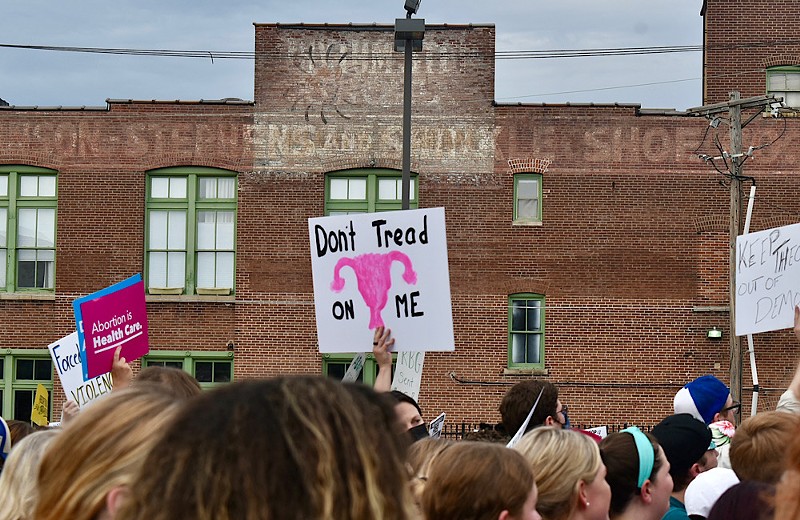
Reuben Hemmer
A crowd outside of Planned Parenthood in the Central West End protest the Supreme Court's overturn of landmark abortion cases on June 24.
This reporting was supported by the International Women's Media Foundation's Reproductive Rights Reporting Fund.
Wait times at abortion clinics in southern Illinois have jumped from days to weeks after the overturn of Roe v. Wade spurred red states to restrict abortion access.
An influx of patients has caused wait times at the Planned Parenthood in southern Illinois to rise from four days to three weeks, according to Julie Lynn, director of communications for Planned Parenthood of the St. Louis Region and Southwest Missouri.
Same goes for the Hope Clinic for Women in Granite City, Illinois, where out-of-state patients comprise 85 percent of the clinic's load, up from 60 percent.
“We’re seeing patients mostly from Tennessee to Arkansas and Texas, Louisiana and Mississippi,” says Dr. Erin King, executive director of Hope Clinic for Women.
States with some of the strictest abortion laws in the country neighbor Illinois. Missouri, Arkansas, Alabama and Mississippi prohibit abortions almost entirely. Tennessee’s current law prohibits abortions about after six weeks of pregnancy, but all abortions will soon become illegal in the state after its trigger ban takes effect August 25.
“And because of that, we have seen a huge surge in patients as expected, but I think that the surge happened faster than expected,” Lynn says.
Planned Parenthood staff have planned for a Post-Roe reality for several months, according to Lynn. The nonprofit’s clinic in Fairview Heights, Illinois, will likely see operational changes in the next month.
“What exactly that looks like — whether it’s operating seven days a week or going from eight to 10 hours a day — is unclear, but there will likely be operational changes soon to meet the need,” Lynn says.
Several of these patients have required funding and logistical support. Planned Parenthood and Hope Clinic for Women’s Regional Logistics Center has seen a huge surge in calls as a result. Staff there help connect patients with local abortion funds and make travel arrangements.
As state governments have tightened their abortion laws since the overturn of Roe v. Wade, Missouri and Illinois patients at nearby abortion clinics have decreased, according to King.
“Appointments are still available in this region, and we really don’t want our patients who are local to feel like all of a sudden they’ve lost their community provider because all of these people are coming from out of state,” King says. “We’re really trying to prioritize our local patients, so we can get them in quickly and still see them.”
In the meantime, Lynn says Planned Parenthood is working with state and federal government officials to ensure patient and provider safety. Abortion advocates have continuously urged Illinois Governor JB Pritzker to direct more public funding to abortion clinics.
Planned Parenthood hopes for some funding for logistics.
"The reality is that people are having to travel to get abortions. ... For some people, they've had to travel hundreds of miles to get health care," Lynn says. "That is a glitch in our system that should have changed long ago, but now we have an opportunity to make that change."

